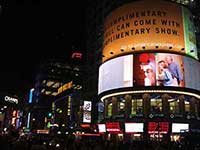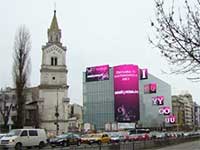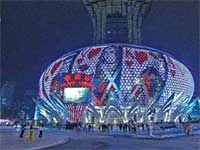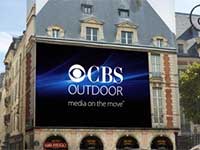The Weak Link: Hacker’s attack on Moscow LED screens
For a journalist there is nothing better than scandal. But the topic on LED screens and applications is technical, flat and dull. That’s how it was until now. Suddenly a very scandalous and juicy topic was supplied to us by the recent event in the Russia’s capital. On two LED screens in downtown Moscow the indecent video clips were shown. This is not the first case: our magazine reported a similar event in the USA (see our issue “Utilization of outdoor screens in emergency situations”).
Facts
In the evening of January 14, 2010, two huge outdoor LED screens overlooking the Moscow’s major avenue, the Garden Ring, were playing pornographic clips for nearly half an hour causing a great amusement among drivers and passenger and great indignation among the city authorities. In spite of the late hour and fairly light traffic, the unusual spectacle immediately created a traffic jam: numerous spectators decided to stop and take a memorable photo of the LED screens displaying enormous pictures of questionable and obviously illegal nature.
Cause
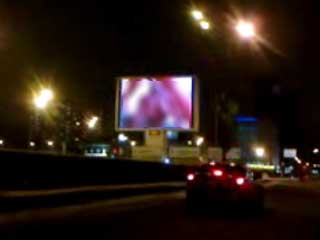 The indecent video clip on an outdoor screen in Moscow
The indecent video clip on an outdoor screen in Moscow(The photo was heavily edited...)
An outdoor LED screen is a computer-driven device. It retains therefore all the advantages and shortcomings of the installed software. The absolute majority of outdoor LED screens (especially those manufactured in China) are controlled by standard Microsoft programs which are rather vulnerable to hackers’ attacks. A specialist needs only to invest a certain amount of time and efforts to hack a website of some company or institution. However most such attacks remain anonymous and unseen. To gain access to a public LED screen makes much more sense since the results are clear for everyone to see.
In the past various video blogs ran articles on big screen hacking. For example, in 2007 a large LED screen in the very center of Moscow that belonged to CityVision was reported to have been successfully hacked. However, this proved to be a clever video simulation allegedly provided by competitors. Current case with indecent video on outdoor LED screens is no such fake but an unpleasant reality. What can be done to withstand further attacks?
Solution
It is possible to prevent unauthorized access to remote network stations (in our case, outdoor LED screens). Moscow committee on advertising was fast to announce that it plans to strengthen safety of informational channels to all outdoor LED screens in Moscow to avoid further embarrassment. The easiest way to stop attacks on outdoor screens is to force screen operators to download content using only local networks, as it used to be done a few years ago when this technology was new and immature.
In that case though outdoor screens will lose the main advantage over standard and stationary video carriers – the possibility to operate in the online mode when new content may be transferred to the outdoor screen without any delay. This flexibility that turns a standard advertising carrier into a useful social instrument is only possible if outdoor video screen operates using complex and sophisticated control systems. Advanced control systems were designed and are currently supplied by such well-known manufacturers as Daktronics (USA), Barco (Belgium), NAO-Pro (Russia).
Generally, a simple and safe control system can be easily created so that any unauthorized access will be impossible. For example, video screens installed in stadiums are generally well-protected, they are manually controlled at all times and the data is transferred via the local network. But the data transfer to remote locations via the Internet is based on other principles.
Whatever safety measures are taken, the flexibility of control and instant data transfer functions in the informational LED screen networks must be protected at all costs. The outdoor screens must be supplied with the foolproof control systems capable of preventing attempts at hacking the system and offering operators reliable real-time communication protocols with screens from a control center. LED screens remain an expensive item and it’s silly to save pennies on a control system that may turn to be a weak link of this sophisticated technology.

